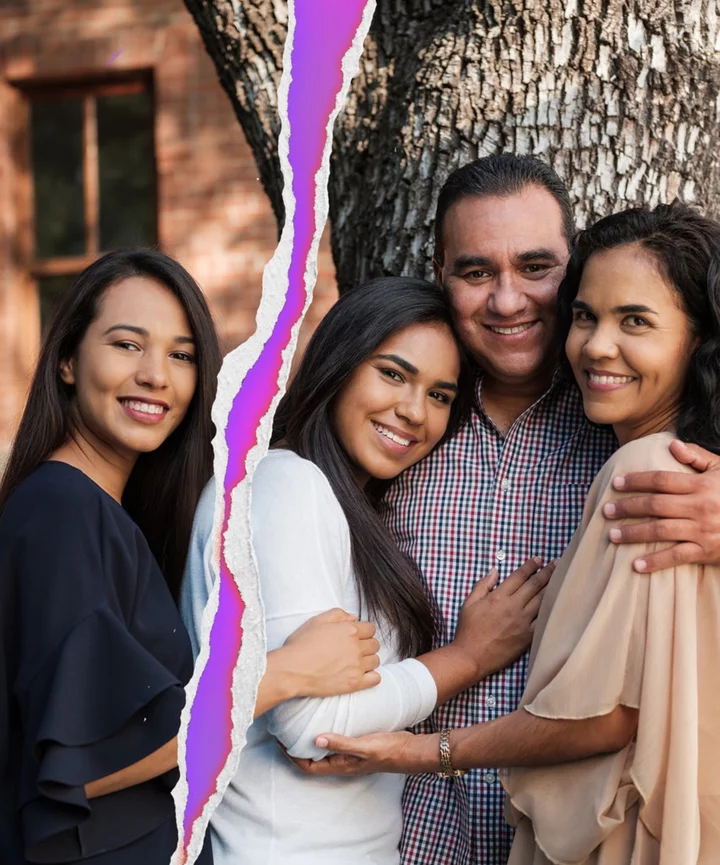Giovanna “Gigi” Gonzalez hasn’t spoken with her mother for almost two years. After years of unresolved conflicts about money, entitlement, and boundaries, Gonzalez decided to go no-contact. The last straw: an incident where her mother attempted to physically assault her. Despite receiving pressure to rekindle her relationship with her mom from the family members Gonzalez is still in contact with, she believes severing ties has given her the peace and freedom to grow in her personal and professional lives.
“It’s normal to feel [the] loss [of your mother],” Gonzalez tells Refinery29 Somos. “But on the other side of estrangement there is peace. I feel so at peace now that I’m not on edge thinking, am I setting my mother off? Are we going to have an argument? It’s not like a ticking time bomb anymore, and with that peace I’ve been able to flourish.”
“On the other side of estrangement there is peace.”
Giovanna “Gigi” GonzalezGonzalez, who now dedicates her life to teaching first-generation students and young professionals of color how to manage their money and gain financial freedom from their families, is part of a larger movement where adult children are cutting off their abusive relatives. Research by Karl Pillemer, a professor at Cornell University and author of Fault Lines: Fractured Families and How to Mend Them, found that 27% of people in the US above the age of 18 were estranged from a family member in 2020. While Pillemer’s research also determined that the rate of estrangement is highest among non-Latine white families and lowest among Latine, Black, and immigrant families, Gonzalez is one of many Latines that are increasingly breaking up with their relatives.
Estranged from her own parents, Violetta Fernandez, a licensed mental health therapist and parental estrangement coach, supports clients experiencing family trauma, especially those who are unable to have close relationships with their biological and non-biological families. Largely working with young people who identify as Latine and/or queer, Fernandez explains that most of her clients decide to break up with their parents because of a history of emotional abuse and neglect.
In her experience coaching Latine people through parental estrangement or connecting with them on social media, Fernandez says there are a few reasons why a family breakup might occur in the community. Many of her clients were raised by elders with untreated intergenerational trauma, oftentimes related to their own migration, poverty, or history of abuse, as well as ultra-conservative and fundamentalist beliefs rooted in religion, white supremacy, and patriarchy. So when children start questioning the ways they’ve been treated and/or the values they’ve been raised in, this reservation is understood as a threat or as a form of disrespect.
“When children start questioning the ways they’ve been treated and/or the values they’ve been raised in, this reservation is understood as a threat or as a form of disrespect.”
nicole froio“If you’re in a state of survival, in your mind, you’re trying to protect your family by controlling it,” Fernandez says, adding that control could escalate to family violence, including emotional and physical abuse. Even more, due to the pressures to assimilate, some immigrant and Latine families view far-right values and ideologies as a moral standard. “You have to look a certain way, be a certain way. So anything that goes against that belief system is a problem. And there are different reasons and different levels of it.”
For instance, when Fernandez began questioning her family’s conservative values and articulated new boundaries, she became the black sheep of the family. Similarly, for Gonzalez, interrogating her role as the eldest daughter, and specifically the expectation that she had to financially support her mother even though she was in her own precarious monetary situation, sparked conflicts that nearly became physical. Gonzalez, who was trying to meet her own money goals at the time, was pushing back on a gendered expectation of marianismo that pressures Latina daughters to self-sacrifice and put their families first.
“I think our community runs on collectivist values,” Gonzalez says. “The group’s interests are more important than the individual’s interests, so the individual’s needs and safety, none of that matters. What matters most is harmony in the overall family. … Everybody put your issues aside because the family unit is more important.”
“Everyone knew me as the good, quiet kid. When I started to stand up for myself, they did not like that. They didn’t like the boundaries that I was setting.”
Miguel MolinaFor Miguel Molina, who is in low contact with his parents, becoming his own individual person outside of his family unit was what triggered familial conflicts. At the time, Molina was living with his parents and beginning to question the homophobia, racism, and sexism that he was raised to accept as good Catholic values.
“They were used to me being the perfect child because I was the firstborn,” Molina tells Somos. “Everyone knew me as the good, quiet kid. When I started to stand up for myself, they did not like that. They didn’t like the boundaries that I was setting.”
But challenging his family’s bigotry was necessary for his own personal growth, healing, and happiness.
“Being in contact with them is just very stressful,” Molina says. “It always had to be their way. There’s always yelling involved. It was just never a peaceful time. So I knew that I had to separate myself from them as much as possible in order to just live my life and just be able to focus on myself.”
In addition to distancing himself from his family, Molina also started seeing a therapist to both work through the estrangement and explore his own sexuality. Free from the restrictive gender roles he grew up with, Molina is now out as a queer man and makes TikTok videos about his experiences with parental estrangement. He started sharing his story as a therapeutic coping mechanism, but after receiving positive attention on the social media app, he realized that he was helping other young people who had volatile relationships with their families. “It seems so straightforward to set boundaries with your parents, but it’s not,” Molina says. “Because you don’t grow up with the tools to do that.”
“I had to separate myself from them as much as possible in order to just live my life and just be able to focus on myself.”
miguel molinaFernandez views the wave of family breakups positively. According to her, these chosen separations, while complicated and painful, are transforming culture. By setting boundaries with relatives — whether through low contact, limited contact, or no contact at all — Latines are no longer forgiving abuse just because of some cultural romanticization of self-sacrifice and family unity and are breaking the cycle of intergenerational familial violence.
She reframes breaking up with family as something that can help the family in the long run. “After setting boundaries and taking some space, some parents adapt to what their kids are asking for,” Fernandez adds. “So you are actually helping your family evolve.”









